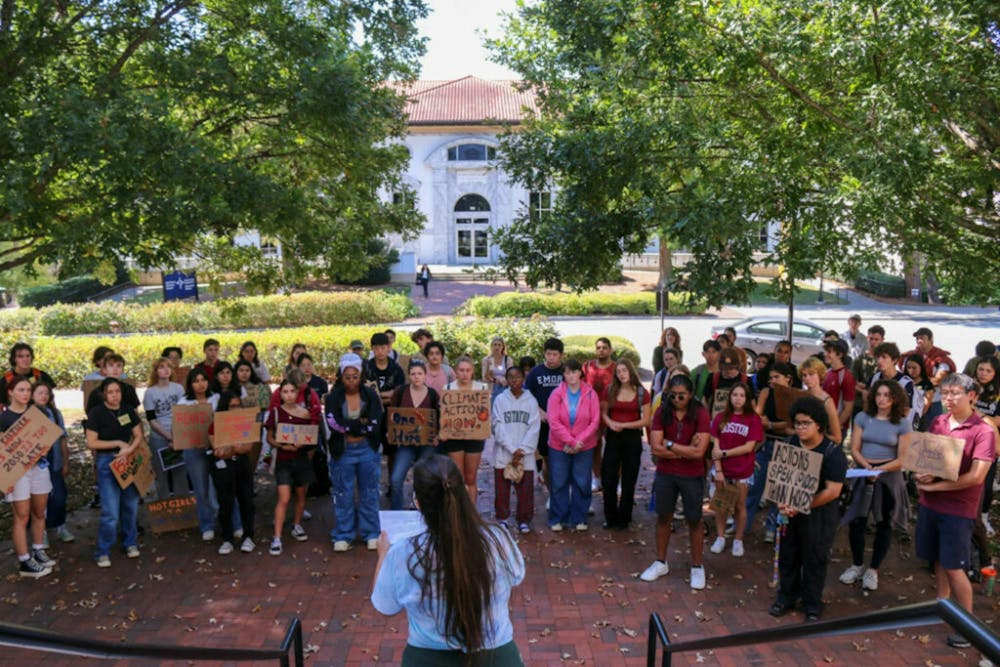In fall 2023, students gathered on Asbury Circle to paint signs, march through campus and demand that the Emory University administration approve a comprehensive climate plan. This fall, however, climate strikers were noticeably absent. With no on-campus climate strikes since September 2023, leaders of green organizations on campus are left speculating about the causes of the inaction. For some, a lack of specific environmental issues to advocate for is to blame.
In previous years, the Emory Climate Coalition (ECC), a student organization advocating for taking action towards environmental issues, organized climate strikes. The ECC formed in 2019 during the global youth-driven climate movement as a combination of multiple campus organizations: the Emory Climate Organization, Emory Climate Analysis and Solutions Team, and the Emory Climate Reality Project (ECRP). The group held its first strike that fall, beginning an annual tradition of climate strikes that lasted five years.
Previous climate strikes have urged Emory to join Race to Zero, an international campaign for non-state actors to achieve zero carbon emissions, which University President Gregory Fenves joined in 2021. In 2023, students demanded revisions to Emory’s climate policies, including adopting the Climate Action Plan. However, according to ECRP President Dakota Taufeeq (26B), these strikes have become less specific over time.
“Our strikes are Emory-focused,” Taufeeq said. “If there isn’t a specific kind of environmental issue or reasoning why [we’re striking], then it becomes counterintuitive to have one.
ECRP Climate Action Chair Sarah Orozco (25C) shared a similar sentiment, noting the lack of a specific call-to-action for a potential climate strike this semester, compared to the climate policy issues that inspired strikes in previous semesters.
“Emory has pretty good policies on paper, and the challenge is the implementation and the transparency around the implementation,” Orozco said, noting that it’s difficult for students to track Emory’s progress in implementing updated climate policies. “ …There’s no single message right now to push across with regards to climate policy at Emory.”
Taufeeq shared concerns about transparency, questioning the effectiveness of a climate strike when the general Emory population may not know about the University’s specific climate policies.
“When we were striking about the Climate Action Plan, we also realized that not everyone even knows what the Climate Action Plan is,” Taufeeq said. “Because there was this degree of removal, it was less impactful.”
Oxford College Student Government Association Environmental Sustainability Chair Muram Dafalla (25Ox) agreed that she wants Emory to be more transparent about its climate efforts, but said that she does not see why a lack of transparency should deter a climate strike.
“If anything, it’s a reason for [a strike],” Dafalla said. “Students can call out for wanting to have more transparency from the institution about what exactly is going on.”
Dafalla stated that the lack of a climate strike is “concerning,” mentioning that Emory has received criticism for the execution of its sustainability goals, such as its disposal of waste.
Although the University aimed to divert 95% of its construction and non-construction waste away from municipal landfills by 2025, Professor of German Studies and Linguistics Hiram Maxim claimed in the fall that that waste diversion has dropped to 51% — over 20% lower than pre-COVID-19 levels.
“Seeing the protests at the end of the last school year and everything, it’s shown that there are students who are willing to have some sort of movement and make some type of change in this school if they have a certain problem,” Dafalla said.
Orozco said that ECRP is focusing more on educating students and engaging in local climate initiatives this semester. In place of a climate strike, ECRP is holding two events this semester: a documentary screening and an educational event on current environmental policies and initiatives in Georgia.
“Local action and policy is incredibly important and incredibly impactful with regards to almost all issues, but climate is one of them … especially when the national government, or even the state level government here is not very receptive,” Orozco said. “You can still have a lot of impact.”

Catherine Nan (she/her) (26Ox) is a former writer for The Emory Wheel. She is from Potomac, Maryland and has played the flute for ten years. You can find her on a bike ride or at a concert.






